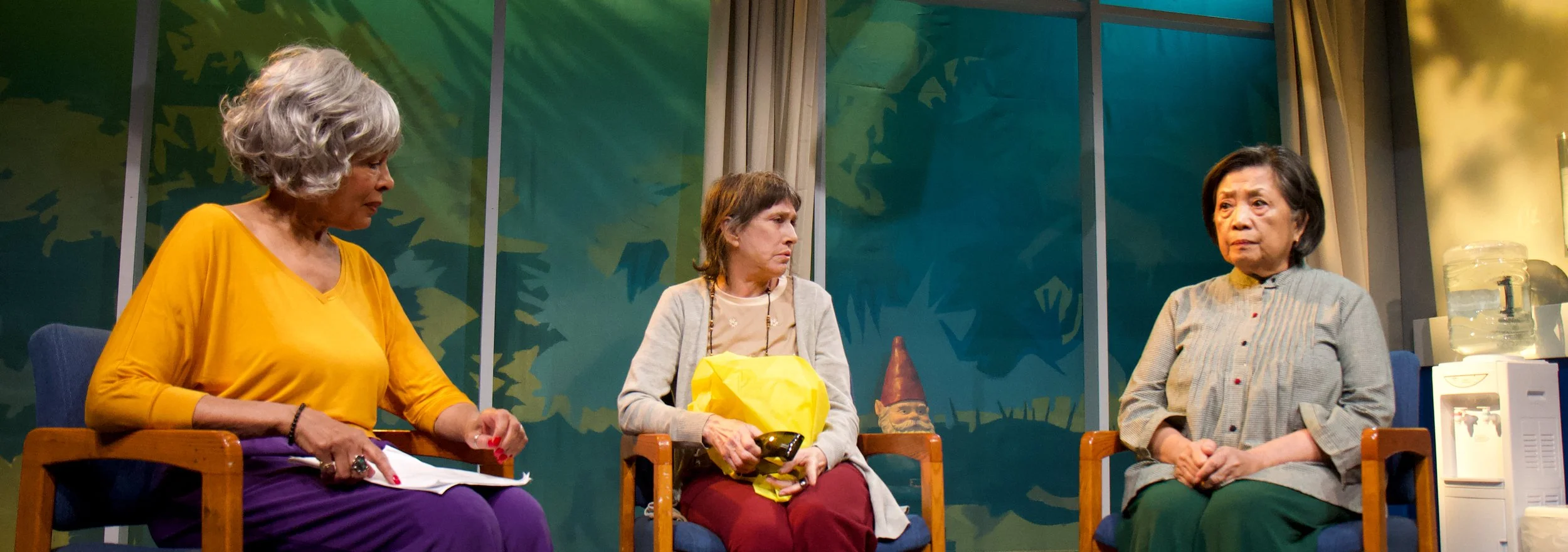What have you done with your life so far? If it ended tomorrow, could you honestly say you have made the most of it? Playwright Sutton Vane poses these questions to both the characters and the audience in Urban Stages's remake of his timeless 1924 play Outward Bound.
The set is surprisingly elaborate, considering the small size of the stage. Members of the audience audibly gasped when red curtains rose to reveal the glittering, elegant lobby of a luxury steam liner. Toward the back of the lobby there is a bar where a jolly man named Scrubby (Wilbur Edwin Henry) serves drinks to passengers on cushiony chairs and glass tables. Across from the bar are sliding-glass doors that lead to a deck where characters watch the sky change from day to night while listening to the sounds of cawing seagulls and crashing waves. All of these elements skillfully come together to create the illusion of being stranded at sea with nowhere to go but your destination.
But what is the destination? No one onboard seems to know.
The seven main characters include Tom Prior (Paul de Cordova), a spoiled rich boy who drinks to forget the life he screwed up. He is admired by a wealthy socialite named Mrs. Banks (Laura Esterman), who converses only with those in her class. They are both befriended by the Rev. Duke (Clayton Dean Smith), a kindly man who takes pity on those who seem troubled. A friendly elderly woman named Mrs. Midget (Susan Pelligrino) strives to be liked by all, while business tycoon Lingley (Michael Pemberton) isolates himself with his haughty manner. And then there is the young couple, Anne (Kathleen Early) and Henry (Joe Delafield).
Anne and Henry are the play's ghostliest characters. Prior overhears them whispering about a secret that has something to do with leaving the gas on at their house, not wanting to be separated, and missing their dog.
Based on this conversation, Prior realizes, "We're all dead, aren't we?"
This revelation occurs early in the play, halting the developing story in its tracks. After all, if we know the passengers are dead, what is the mystery?
It is here that the play's true nature reveals itself. Outward Bound is a tense, suspenseful character study focusing on seven very different people who must look deep into their souls before a feared Examiner (Drew Eliot) arrives onboard to sort out who goes to Heaven and Hell.
Each character's trial is tense and revealing. The Rev. Duke's tugs heavily at the heart, while Prior's stabs a knife right through it. Prior is very likable, though he insists the halo people see above his head is only there because he means to pawn it. When Mrs. Midget attempts to plead for his soul by suggesting that he never had a chance to do right in life, he cuts her off, saying, "I've had every chance."
Credit must be given to de Cordova (the understudy in this role) for the believable and sympathetic way he portrayed all the dimensions of this complex character. He movingly brought out the inner goodness of a man whose surface appears chillingly shallow.
But Cordova is not the only one who shines in this tale of reckoning. Every member of the cast is so nuanced and believable in his or her role that every word spoken feels authentic.
However, it is the mysterious young couple, Henry and Anne, whose story will haunt your thoughts long after the curtain has dropped. Their souls are never probed by the Examiner, and there is a reason for that. Their secrets are revealed at the play's climax in a very eerie, unforgettable scene. So as not to spoil the surprise, I will only cryptically say that you will think of this ending every time you hear a barking dog.
Vane wrote this play after being discharged from the British Army in 1914 due to severe shell shock. The repressed feelings he had from that time have risen with a vengeance on the pages of this story. Death, doom, and destruction are explored in great depth, yet it is the will to live and live bravely that overcomes all. Ironically, given its title, Outward Bound will make you look inward.






